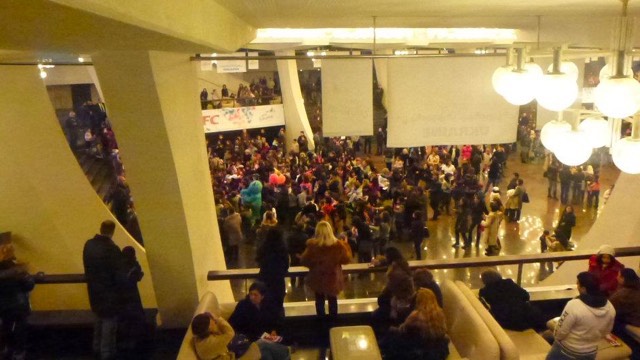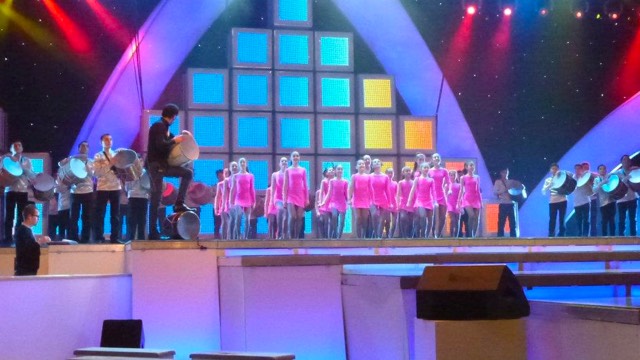Armenia was my first ‘on the ground’ Junior Eurovision Song Contest experience. I chose to go because I held a lot of curiosity about the Caucasus region, and the Song Contest was the perfect excuse rather than the main focus. I can state hand on heart that prior to 2011, I was no fan of the ‘kids show’.
But within the event walls I really liked what I saw. Despite the presumptions of pushy parents and little stage-diva child performers, I only witnessed happiness and excitement. I saw friendships blossom between the acts and the countries there, not a focus on the competitive nature.
Same Name, Different Show
Unlike its adult sister, the rehearsal period was far more relaxed. Between the stage slots, many of them were together, bonding over shared experiences such as favourite singers, clothes, and toys, rather than being separated by their language and cultural differences.
At the show itself, they cheered on their fellow competitors whilst performing and also when they received their points. They hugged when the winner was declared rather than crying at their own loss. As a counter to that, however, I shed a few tears over how lovely the atmosphere was, even if ‘Candy Music’ was not my favourite to win. My perceptions from that moment changed. Junior Eurovision has the same sense of professionalism you witness at Eurovision but with much less stress and psychological game whilst ‘in the game’.
A Sense Of Community
Outside of the performance space, the sense of camaraderie between attending fans, press and delegations was also far easier to develop. There was no sense of competition between the community websites; during the days spent in the cold and tiny press centre we joined forces and shared resources, whilst in the evening we would find a local restaurant to feast together.
Given the smaller nature, delegations tended to stay in just one or two hotels together, allowing delegations to mingle and socialise outside of the venue. It also makes it far easier to get to know the key players and build those important relationships in a relaxed setting over a drink at the hotel bar.

Yerevan, Junior Eurovision 2021 (Photo: ESC Insight)
And then the local fan club, proud that a little bit of the Eurovision excitement had come to their doorstep, were ready to welcome visitors with open arms. One of the best explorations I have ever had in a host city was courtesy of a then 16-year-old Armenian fanclub member keen to show us the key sights of Yerevan such as the Cascades. That personal touch made it a very special memory for all of us there.
As a consequence, all of those elements combined has made it harder for me to view the bigger Eurovision as ‘friendly’ and ‘fun’. Over the course of the past 11 years, I have now attended almost as many live Junior Eurovision events as Eurovision itself, including Ukraine, Belarus, Bulgaria and Malta. Every late November/early December my Facebook timeline displays happy memories of those times which I am keen to re-share with friends, but Armenia does hold a very special place in my heart and its why I am returning now.
I expect many of the elements from over a decade ago to stay the same.
Location, Location, Location
We are back at the same venue, known locally as Hamalir. It’s a welcome return to the venue set high over the city with a stunning marble interior. But I would hope that they remember to turn on the heating for delegations and press earlier this time (thus earning itself the nickname ‘Ice Palace’ from me personally), and that they also switch on the lights in the ladies bathrooms before the shows occur. I laugh when I reflect on that memory, but I am wary enough that I am packing my own toilet roll when I go to the venue. There is certainly still the sense of chaos and last-minute organisation for the event, but admittedly this is not unique to a Song Contest nor a deterrent for my own re-attendance.

Yerevan, Junior Eurovision 2021 (Photo: ESC Insight)
On a very happy note, OGAE Armenia have reached out to the attending fandom already to let them know they wish to host us once again for city tours. I look forward to making new local friends through that plus gaining more unique insights into local life. I truly believe this is a learning that should be taken on more by host nations fanclubs at the adult version.
And outside of the event, I have a list of locations I didn’t get to on the first visit – from the Armenian genocide memorial to a tour of the Ararat brandy factory, and beyond the city into places like Garni Temple and Khor Virap. But I also know my favourite restaurant Old Erevan is still there, ready and waiting to serve us a plethora of delicious food, whilst the resident folklore band is ready to play as we dine again – a true cultural highlight for those of us there the first time round.
Nothing Stays The Same
But of course, a fair bit has changed within the Contest itself.
Back in 2011, the stage set appeared to consist mainly of plywood lightboxes and cardboard dressings that looked like they could blow over in a slight breeze. Junior Eurovision has moved on enough to realise that the event deserves to be the equal of Eurovision with the ability to appeal beyond the younger audience, and has the technological know-how to deliver the same look and feel. The choice of utilising wide LED screens and floor lighting comes with a higher price tag, but the benefits are hopefully a slicker and more generational-crossing entertainment show.

Yerevan, Junior Eurovision 2021 (Photo: ESC Insight)
The entries for the most part have moved onto being more modern, age-appropriate and with wider appeal. We still have the language rule that dictates that the song should be in the native language for at least its majority, creating increased diversity as we switch effortlessly from Irish to Kazakh. But genre-wise instead of the tendency towards ‘cutesy’ or ‘novelty’, we have more selections that would not feel out of place outside of the event in terms of content and sound.
Many Eurovision fans have already noted that winning entries from the likes of Roksana from Poland in 2018 and Malena from Armenia in 2021 would have been more than welcome – and proven more competitive – in May than their country’s senior selections. It’s that more mature approach rather than children’s tailoring that makes Junior a very accessible event beyond the key 8- to 14-year-old target audience.
Whilst we remain roughly in the same calendar period for the contest, the EBU has seen fit to experiment with the timeslot for Junior. We have moved away from mimicking the Eurovision Song Contest with Saturday shows, prime time viewing and trying to adapt the program to the child-forward audience despite the adult timeslot. We now see it take place on a Sunday afternoon, which means a timeslot that is more accessible across all the time zones of competing nations (a concern in the Caucasus region in particular), and without the stress of trying to find some odd middle ground of child vs adult program timing. Many of the competing nations now see the show broadcast on specialist children’s channels.
For several years, the show has run voting as an open online process rather than a paid phone operation for each country, allowing everyone no matter their location to be part of the decision – something that the adult Contest is now introducing as part of its operations in the coming 2023 show. And it has dumped the advertising and sponsorship messages (or keenly pushied semi-political fundraising messages), which means that families can sit down together and watch the show, and limits broadcasters from having any commercial concerns or need to filter content.
Over the course of the decade as well, we have seen many countries come and go. I would never have imagined back on my first visit that my own home country of Australia would find itself participating, nor Kazakhstan would join. We have seen a shift of mainly Eastern countries at Junior, to a more pan-European list including the return of the big 5 countries such as France, Italy and now the United Kingdom who will be in attendance this year.
The Power Of Eurovision, Junior Or Otherwise
But of course, it’s not just me reflecting this year on what has come in the past and on what Armenia can deliver for the show now. 2022 marks the 20th anniversary of Junior Eurovision itself, and for this occasion, Armenia has managed to gather 11 of the 20 past winners for performances on the night. It will showcase the development and the strengths of both artist and concept, something that is only getting bigger and better each year despite some protests online to the contrary.
But it remains uniquely Armenia’s moment to shine on the world stage. The country has not one but two songs to celebrate – ‘Qami Qami‘ as the winning entry to bring us back to Yerevan, and also ‘Snap‘ by Rosa Linn – their underperforming Eurovision entry from this year now worldwide hit. I expect the local pride to be on full display, and for me to yet again be emotionally moved by their hosting.
For the outsider, Junior Eurovision is an opportunity to discover some far-flung and more unusual destinations of Europe. For the participant nations, they can enjoy s Song Contest without the same sense of pressure. A win doesn’t immediately lead to the demand of hosting, but if they wish to, they can on a smaller budget and pressure than a victory in May would entail. Nevertheless, they are afforded the same ability to deliver nation-building moments on an internationally-seen scale; utilising advanced broadcasting equipment and gaining skills and knowledge from the European Broadcasting Union on how to stage such events. Ultimately, it’s the perfect mid-ground in locations that perhaps would struggle to do the same for Eurovision proper.
For me personally, attending the Junior Eurovision Song Contest means I can get a sense of the country whilst surrounded by current and future friends to share the experience within the ‘safety’ of the event. Viewing the show now really is the perfect opportunity to free ourselves from the assumption of what Junior is, and an opportunity to see more flavour of a host city’s culture which I feel is perhaps stripped from the Eurovision Song Contest year on year.









